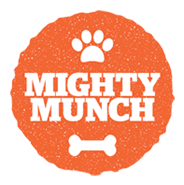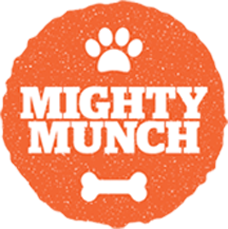Your dog might not smile for photos, but that doesn’t mean you should ignore their pearly whites! Just like us, our dogs need consistent dental care to keep their teeth, gums, and jaws healthy.
There are a few things you can do at home to care for your dog’s oral health, which we’ll discuss soon, but it’s also important that your dog has a professional dental cleaning from time to time, to thoroughly clean those hard-to-reach areas where bacteria thrive.
So, how often should dogs have a dental cleaning? That’s what we’ll talk about today. Regular cleanings are important, but they can quickly get very expensive. We’ll explain how often you need to schedule cleanings for your dog, and how you can reduce their frequency.
If you’re on a budget, the best way to protect your pup’s dental health is with dog dental chews. Here at Mighty Munch, we have the best dental sticks for dogs. They’re natural, potent, and dogs love them! They won’t replace dental cleanings, but they do mean your pup needs them less frequently.
Why Your Dog Needs Frequent Dental Cleanings
First of all, why does your dog need regular dental cleanings? There are a few reasons why you can’t afford to neglect your dog’s dental care - here’s why professional dental cleanings are so important for your pup.
Preventing Dental Diseases
One of the main reasons for frequent dental cleanings is to prevent dental diseases such as periodontal disease, gingivitis, and tooth decay. Plaque and tartar can quickly build up on your dog's teeth, leading to inflammation and infection of the gums.
Without regular cleanings, these conditions can progress, which can leads to something no pet owner wants to see - their dog in pain. It could even cause tooth loss, or affect your dog’s jawbone, which is essential for their ability to chew and eat.
Overall Health Benefits
Oral health is closely linked to overall health. Bacteria from untreated dental issues can enter the bloodstream and spread to vital organs, leading to serious health problems such as heart disease, kidney disease, and liver infections.
Regular dental cleanings help to remove harmful bacteria from your dog’s mouth before they have a chance to get out of control, reducing the risk of these systemic health issues and promoting a longer, healthier life for your beloved pup.
Alleviating Pain and Discomfort
Dental problems can be incredibly painful for dogs, just as they are for us. Issues like tooth decay, broken teeth, and infected gums can cause significant discomfort, making it difficult for your dog to eat, play, and enjoy life.
It’s horrible to see your dog lose interest in their favourite activities, and to know that they’re in pain is heartbreaking. Regular dental cleanings help to identify and address these problems early on, keeping your dog pain-free and as happy as can be.
Cost-Effectiveness of Preventive Care
While professional dental cleanings may seem like an added expense, they can actually save you money in the long run. A dental cleaning may cost $100, but if your dog requires a tooth extraction or more serious dental work, the bill could easily be above $1,000.
So, addressing dental problems early through routine cleanings can prevent the need for more expensive and invasive procedures, such as extractions or surgeries. Investing in your dog's dental health now can save you significant money in the future, and keep your dog healthier.
How Often Should Dogs Have a Dental Cleaning?
So, how often should dogs have a dental cleaning? It’s important to get the timing right, so that you’re protecting your dog’s oral health without spending more than you need to on cleanings. Here are some things to think about when deciding how often your dog needs a dental cleaning.
Factors Influencing Frequency
The frequency of dental cleanings for your dog depends on various factors, including their breed - some breeds are more prone to dental issues than others. Small breeds, such as Chihuahuas and Dachshunds, often require more frequent cleanings due to their susceptibility to periodontal disease.
Age is also a factor, as puppies have different dental needs compared to adult dogs. As dogs age, they may need more frequent dental care to prevent tooth decay and gum disease. Your dog’s diet also matters - too much wet or human food can cause plaque and tartar to build up faster.
And finally, the level of dental care you provide at home, like using dog dental chews or brushing your dog’s teeth, can make a big difference. A daily dental stick can significantly reduce plaque and tartar, meaning that you can schedule dental cleanings less frequently, saving money.
General Guidelines for Most Dogs
So, how often should dogs have a dental cleaning? Most vets recommend a professional dental cleaning once a year for dogs. This yearly visit helps prevent plaque and tartar buildup and allows the vet to catch any potential dental issues early.
Dogs that are at a higher risk for dental problems, such as small breeds or those with pre-existing conditions, may benefit from cleanings twice a year - you can talk to your vet about what’s best for your pup.
Signs Your Dog Needs a Dental Cleaning
Even with regular checkups, it’s important to watch for signs that your dog might need a dental cleaning. If they have bad breath, yellow or brown teeth, or red or swollen gums, you should schedule a cleaning.
Also, if they have difficulty eating, seem to be chewing on one side of their mouth, or are drooling significantly more than normal, they may have a dental issue that should be investigated.
At-Home Oral Care Tips to Reduce the Need for Professional Cleanings
If you’re wondering how to prevent dental disease in dogs at home, there are a few strategies you can use to help you reduce the need for frequent dental cleanings. Here are some tips to get you started.
Dog Dental Chews at Mighty Munch
You’ve probably seen dental chews at your pet store, but are dental sticks good for dogs teeth, or are dental chews bad for dogs? In fact, they’re great for your dog’s teeth and oral hygiene in general. But how do dog dental chews work?
Dental chews are designed to freshen your dog’s breath and clean their teeth as they chew, helping to reduce plaque and tartar buildup. Compared to other at-home dental care methods (dental sticks vs floss and brushing dogs teeth vs dental chews), they’re the most effective and convenient.
Not all dental sticks are effective at removing plaque and tartar, and some contain unnecessary or even harmful fillers and additives. But never at Mighty Munch! Our dental chews are backed by vets, made from premium ingredients, and formulated to strip plaque and tartar away!
Made with potent probiotics for dogs that fight bad bacteria, our dental chews will leave your dog’s breath fresher and their teeth stronger and healthier. Rather than trying to make homemade dog dental chews, save your time and give your dog the best product out there!
How many dental sticks can a dog have a day? We recommend one stick per day, and we’ve got two different sizes for you to choose from. When can you give puppies dental sticks? The general rule is 6 months, and our dental chews are safe for all dog breeds and ages.
Looking for more ways to improve your dog’s health and longevity? We have other premium dog supplements, including our top-rated joint supplement for dogs and dog collagen for a shiny, healthy coat.
We also have the best probiotics for dogs Australia for a healthy immune and digestive system, the top rated orthopedic dog beds Australia to help your dog rest comfortably, and the best pet odour eliminator Australia to clean up any accidents or stubborn pet smells.
Regular Brushing and Flossing
Most dogs don’t enjoy having their teeth brushed or flossed, but if your dog will let you, it’s an important part of oral care and can reduce the frequency of professional dental cleanings you need to schedule.
Make sure you’re using a xylitol-free, canine-specific toothpaste and a soft brush. Start by letting your dog get used to the taste of the toothpaste and the sensation of the toothbrush. Gradually increase the brushing time as (or if) your dog becomes more comfortable.
Other Dental Health Products
If your dog really isn’t a fan of having their teeth brushed or flossed, dental wipes can be a good alternative. These specially-designed wipes help to remove plaque (though not as effectively as dental chews) and freshen up your dog’s breath.
Adding dental water additives to your dog’s water bowl can also help reduce plaque and tartar buildup. These additives are usually tasteless and can be an easy addition to your dog's oral care routine.
Closing Thoughts on How Often Dogs Need Dental Cleanings
So, how often should dogs have a dental cleaning? In general, your dog should have an annual dental cleaning, though this may need to be more frequent if they have an existing dental issue or their breed is susceptible to dental problems.
Canine dental cleanings can get expensive, which is why many pet parents opt for at-home preventative dental care - if you prioritise your dog’s oral health, you can afford to schedule less frequent cleanings and save significantly on vet costs.
The best way to care for your dog’s oral hygiene is with quality dental sticks, formulated to strip away plaque and tartar. At Mighty Munch, our premium dental chews are backed by vets and trusted by pet parents across Australia. Plus, dogs love them!
Keep money in your pocket when you invest in preventative dental care for your pup. Shop Mighty Munch today!


